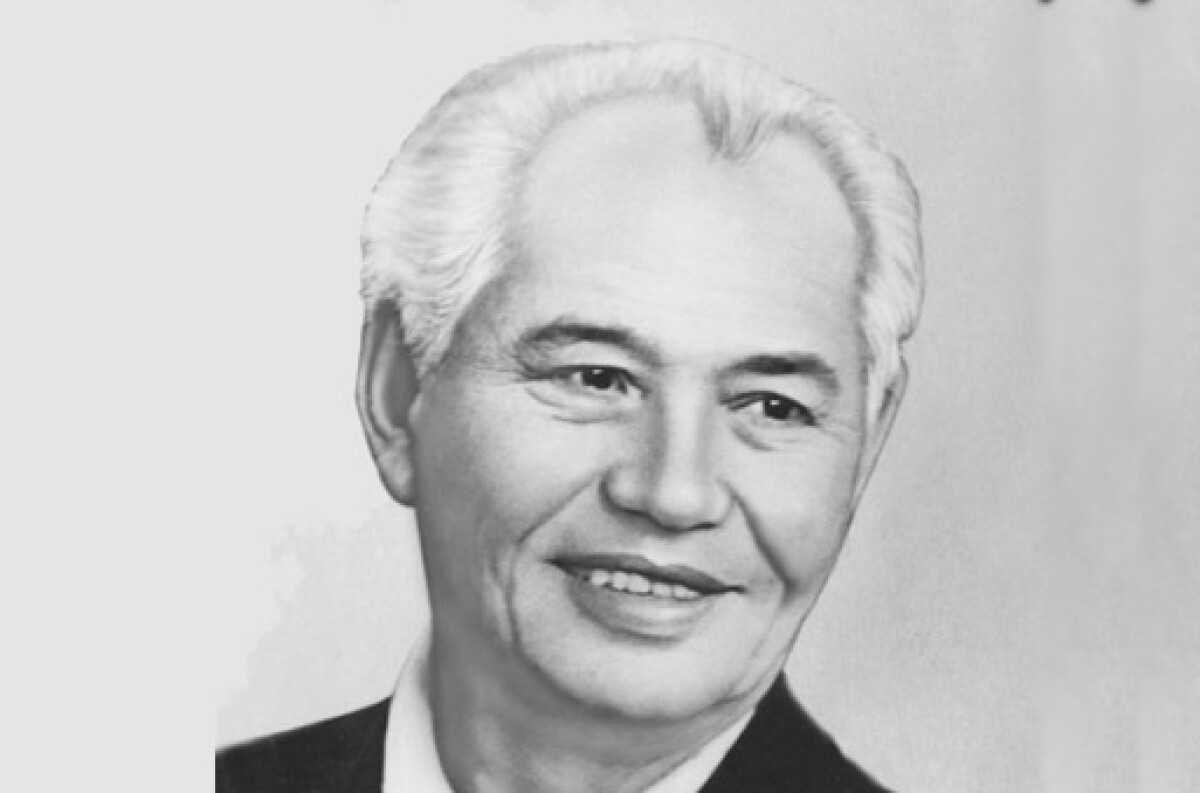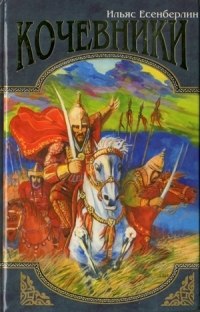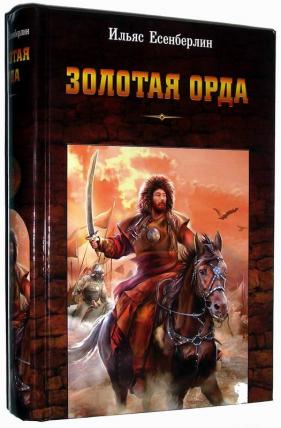
Main point is that "Nomads"
possess the value and literary destiny,
independent neither from last, nor from present environment.
Chinghiz Aitmatov
Reassessment of values in the conditions of construction of the new sovereign state in our county, as well as in other republics of the former Soviet Union, has already happened. Many prominent people of the last time were marked on their merits, which is very pleasant. However, for some reason there were people, who made a huge contribution to national culture, left unnoticed. Ilyas Esenberlin was one of them. His name became a legend both in the steppe and in megalopolises during his lifetime.
It has been a third of century, precisely, since 1969, from the moment of an output of its historical novel "Kene Khan"; I. Esenberlin remained as the most readable author and prose writer. In the Kazakh literature of the 20th century I. Esenberlin has no equal to him in terms of published books, 8 million books, which is not the formal index. His books can be found in every house, town and village, as they highly appreciated by people in the past and nowadays. I.Eseberlin’s historical trilogy 'Nomads" and "Golden Horde»"on political weight and cognitive value are the largest, monumental works of national prose of last century. This is the main criteria for any classic which unfortunately is forgotten by experts of spiritual values.
What is the distinctive feature of I. Esenberlin’s work? This is the main question. It is universal and acceptable question to all writers. Regarding I. Esenberlin’s identity the response to this fundamental issue is well-known not only in writer’s circles, but in the fact that nobody wanted to disclose banal truth about him. How long it lasted? It is seems that his colleagues postponed this pleasant mission to the 100th anniversary of the writer, till 2015, as Khodja Nassredin used to say in such cases "Either donkey will die, or the bullock cart will be scattered". They hope that by that time people will forget partially about the literary idol, and he as other classics of socialist realis, gradually will be in the power of oblivion.
I suppose that it will not happen for any reasons. It is not accidental I. Esenberlin de facto became the unfading character of the 20th century in our republic. It was not just because he was born at the beginning of the century (on January 10, 1915) and left us almost at the end of the century (October 5, 1983), but also his multidimensional literary work, exciting minds of contemporaries who at heart did not lose hope for the future changes and dreamed about the better life for the people.
He was not a great speaker as Mukhtar Auezov. He had no time to grind each word, each phrase. I. Esenberlin faced by other tasks: philosophical treatment of lessons of history, expenses of the present, plans for perspective by means of artistic images. In general, his work — it is global approach to question of development of the nation in the long-term future. And in such way he built his intention. He was able to connect three in one the interrupted ability of the nation independently to think and resolve fatal issues of society without thinking about "trustees" from above and from outside. Thus, he used the classical formula: yesterday, today and tomorrow. So that the nation could build the forecast for a year, it should clearly imagine that it was within last hundred years. He was the one among other who understood that it is impossible to predict for 10 years without knowing the five-secular history and so on. It is the way how missionary I. Esenberlin went to depth of centuries, digging out the most significant events and real historical figures.
It is impossible to analyze this or that book of the author. I.Esenberlin always analyzed and judgment of milestone events both the time and the last centuries. The destiny of the person was primarily important to him. It is not accidental one his early stories called "The song about the person". All his biography is all about "The poem about people", about great and ordinary figures, about heroes, about positive and negative people. Such relation to the work helped him to open characters of literary images which prototypes were generally historic figures.
Another his poem is "Burlivo techet Esil" ("Noisy leaks Esil"). The River Esil on the bank of which the new capital of sovereign Kazakhstan is built and gets prettier, leaks on Sary-Arka plain far from mountains. Today, it indeed attracts not only citizens of Astana, but others. All architectural plans of the city are bound to Esil’s features. The landscape of the right and left bank of this river smoothly passes into a city landscape. Designers of the capital based their work on this river. It became main waterway of the city. There is an impression that I. Essenberlin foresaw a stormy life on coast of this quiet river 50 years ago. In Kazakhstan there are larger and faster rivers, but he chose Esil. Once again I am convinced of the strange coincidence of hid images and future events.
Even the conditional named of his books do not lose over the years their semantic meanings.
Names of his novels represent greatness, beauty and grace. For example, "Gold horses wake up" and "A gold bird". And 40 years later these images as characters were demanded for heraldry of the young state. The horse is an embodiment of a nomadic civilization and "wings" of nomads is shown on the coat of arms of Kazakhstan. "The gold bird" of Ilyas is shown on the flag of Kazakhstan in the form of an eagle, having spread the powerful wings under the sum and over the Great Steppe. His images of yesterday are embodied in reality of today.
As the life of the writer was difficult and his work is complete of risk, many of his works have a fighting spirit. By the way, such character was inherent in full from the author of these books because without them he could not execute and defend his plans. His novels "Fight", "Dangerous Crossing", "Mangistau Front" and "Fight in a distance" witness it. Not only in historical trilogies, but also in all other books I. Esenberlin acting on behalf of his heroes lifted crucial issues of the present and future generations. The porters of that ideology paid their attention to it straight away not in Central Committee of Communist Party of Kazakhstan, but in literary environment. He was "attacked" by "heavyweights" of verbal crafts. Some were "warmed", others were sure of political apathy of Ilya’s works. In a similar situation, wise but dependent on Moscow Dinmukhamed Kunayev could not protect the writer-innovator openly, although, highly appreciated I.Esenberlin’s intention and helped him as he can for the sake of his sacred work.
In the 1960, he for the first time among specialists in his books brought up questions of rehabilitation of such nice sons of our people, as Magzhan Zhumabayev, Akhmet Baytursunov, Alikhan Bukeykhanov and Shakarim. Ilyas named his first grandson after M. Zhumabayev who was not recognized by the ideologists of that time, as protest, setting his own example. In the early fifties, he gave to his son a name of the hero "unpopular" at that time, from the Kazakh folklore "Kozy Korpesh i Bayan-Sulu", knowing it will be difficult to his son in the life.
I. Esenberlin shows us the sincere relation to a national shrine, which for Kazakhs is oral centuries-old verbal art — folklore.
In reality he was "pure spring of popular wisdom, which absorbed into himself the most sacred" — historical memory of the nation, military acts of the legendary names which are not forgotten for many centuries. All of these happened when other writers, who excessively involved in policy, renounced own history, from the greatest figures of the past. He continued to prove all the truth and as a result turned into counterattack from hopelessness.
"Fights", "Fronts" the name of these I. Esenberlin’s books excite reader’s imagination. "Bare Footed Flight"("Aktaban-Shuburyndy") of times of Zhungar invasion and construction boom on bank of Esil of the new capital, it is equivalent remind "Fight in a distance" with the difference that first — in time and the second — in space. Ilyas’ works make readers to think independently. His works are mainly a food for thought, infinite series of associations of the events passing from an era into an era from one state of mind to another. They had deep meaning (which cased envious of other people) and were written very short and clear. His works consist of important and considerable events. They are a source of valuable realities of knowledge of yourself and others. The originality and uniqueness of a literary heritage of Ilyas consists in it.
The entire 40-years life in work of I.Esenberlin briefly can be described in few words "A dangerous crossing", as he preferred unknown for already known path, which was chosen by majority of his colleagues. At the beginning of the 70th he had followers. For the first time in the Kazakh prose of 20th century he created literary school of historians. I. Esenberlin followed the way off road terrain, did not get lost in darkness, ingeniously coped alone with the paramount task and the first successfully came to the victorious finish.
Once smart and honored writer of the Kazakh poetry of the 20th century Kadyr Myrzaliyev wrote followings about Ilyas:
"Ilyas Esenberlin was very interesting person;
He was like a scrap of Ulytau Mountain, its scrap;
Such a big topic, as an Arctic ice;
He was the one, who could break it through!"
Thus, he managed to overcome his "Crossing", full of surprise. Today we have to say: "Praise to the creator!"
Ilyas Esenberlin, being the director of publishing house and the second secretary of the Union of writers of Kazakhstan, in every possible way helped many extraordinary persons. He influenced on Anuar Alimzhanov’s views, and himself published the infamous book of Olzhas Suleymenov "Az and I" in Zhazushy publishing house.
He paternally cared and loved Olzhas, shared experience and undoubtedly had huge impact on young talent in selection of a scale subject about interference of Turkic-Slavic cultures in the field of linguistics — a bilingualism. And he was not mistaken. The novel Ilyas "Cover with the board", the name of which name speaks for itself. I. Esenberlin "trained" and when it is necessary, furiously protected the junior adherents (Kabdesha Zhumadilova, Mukhtar Magauin, etc.) and he, in turn, needed similar support from a manual of Kazakhstan and certain authoritative scientists-historians and writers outside the republic. In addition to administrative, such famous people as the archeologist, the historian, the ethnographer — the academician A. Okladnikov from the Siberian separation of Academy of Sciences of the USSR (Novosibirsk), Christina Damme (Warsaw), Chinghiz Aitmatov (Bishkek), Alkey Margulan (Almaty), and so on gave him moral support. It was not about rescue, wellbeing and position, and about protection of the literary work like the novel "Kene Khan" or the trilogy "Nomads" from inappropriate aggressive criticism and prohibitions. This concept is actual not only in the condition of totalitarianism, but also today though our democracy, which is declared constitutionally, as talent — the phenomenon the extremely rare absolutely new and unusual therefore the shocking conservative majority’s calls. The power of conscience of the nation should take under «boards» of everyone who is naturally talented. The authority required wisdom, "conscience of the nation"— determination and partial belief is required. Otherwise, the rarest talent will be burned to ashes under the pressure of rage of ignoramuses.

The name of the main book of I.Esenberlin "Nomads" is very successful, as it corresponds to a traditional way of life of Kazakhs. Despite that it is was written shortly, it describes all features of nomads’ life. The term itself expands narration boundaries as other adjacent people were also nomads, which our ancestor connected not only one incursions and ten years’ bloody oppositions, but also good-neighborhood.
Transferring the capital from Almaty, the south part, to Akmola, the north, the government of Kazakhstan one more time proved to the world its genetic mobility and existence in the people of nomadic spirit.
Everything that was made subconsciously by people is not realized. Therefore politicians will answer you: it is not I. Esenberlin, it is about us. The essence of works of Abay Kunanbayev, Akhmet Baytursunov, Shamshy Kaldayakov ("My Kazakhstan"), Alikhan Bukeykhanov’s works, Ermakhan Bekmakhanov, Kadyr Myrzaliyev’s verses, Ilyas Esenberlin’s books and many others in language of science is fixed in sub crustal layers of a brain, turning into long-term memory, and can be demanded, including in extremal situations. All of it occurs partly unconsciously, and the individual in such cases really does not dissemble, but he does not notice the motives of the act. And this is the true value of I. Esenberlin’s book. In such case there is a Kazakh saying "zhadymda saktadym", which means "kept inside". This means to overshadow coded information, but keep these intimate thoughts around.
For the sake of justice we will tell that the original authoring name of the trilogy — not "Nomads", but "White Horde", although red fatalists for whom white color meant a shade of the former ideological enemy, and did not want to listen to I. Esenberlin, and he was stimulated to make a compromise. Thereby, the circumstance pushed the author to go "more widely" and "more deeply" to the unknown world of old times.

For me it was always a mystery the written trilogy "Golden Horde", which for a third the century was not understood by the Kazakh society. In everyone’s mind there is a stereotype that this empire was bad for the people of Eurasia, but intelligent people (L. Gumilyov and many others) disagreed. I. Esenberlin 35 years ago understood it better than historians. Information about this official ideology of center, so-called "Wild Horde", it existed three centuries only because it was tolerant to the citizens and cruel for rebellious and impudent.
"White Horde", born in the Kazakh steppes, regardless whose descendants, and most importantly our khans Zhanibek and Kerey, in connection with the collapse of the Red Empire, called the Soviet Union, which I personally think a hotbed of evil, and today is undergoing a renaissance.
The authority of Kazakhstan copes with questions of reanimation of "the White Horde" of I. Esenberlin. For today this is main thing and we need to agree with this fact. When there was a serious discussion about renaming of future capital of Akmola, the Kazakh intellectuals suddenly recalled Esenberlin’s "White Horde" and suggested to name the capital "Akorda". This initiative did not find full understanding in power structures of Kazakhstan, and the main town named "Capital" — Astana. Now the new residence of the President of Kazakhstan on the left coast Esil is called: "Ak Orda". Anyway, thoughts and expectations of I. Esenberlin live in minds of ordinary people and its governors.
Trilogies "Nomads" and "Golden Horde", apart from other nine books, had beneficial influence for realization by us national "I". Among writers of Kazakhstan of the 20th century the creative fuse of I. Esenberlin stimulated process of maturing of the nation to construction of the independent state.
I. Esenberlin’s books have huge nation-formative and state-building value for our ancient ethnos. Ilyas for the first time specified that Kazakhstan is practically the biggest splinter at center of the huge empire of that Golden Horde (Altyn Orda Ulus Dzhuchi, the self-name on Kazakh "Uly Ulys" — "The Great State") which had "head" of the Mongolian origin in the beginning, but the backbone — the boundless Kipchak steppes which fed military-political power of the Power of descendants of Genghis Khan, which became Turkic after several generations. In the modern language Kazakhstan became the assignee of the Golden Horde on which our ancestors on the historical homeland kowtowed.
Practical absence some of the valuable literary works promoting full formation and formation of the Kazakhstan patriotism and state ideology like the trilogy "Nomads" or "Golden Horde" of the chronicler of the Kazakh statehood Ilyas Esenberlin became the most dramatic phenomenon of last 23 sovereign years.
Akhmet Dyusenbayev,
Museum curator at
Museum of history of the Kazakhstan science
RSE "Gylym Ordasy" MES of Kazakhstan
